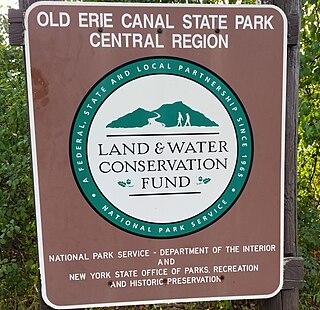There are two distinct definitions of a land trust:
Natural Resources Conservation Service (NRCS), formerly known as the Soil Conservation Service (SCS), is an agency of the United States Department of Agriculture (USDA) that provides technical assistance to farmers and other private landowners and managers.
In the politics of the United States, the process of initiatives and referendums allow citizens of many U.S. states to place new legislation on a popular ballot, or to place legislation that has recently been passed by a legislature on a ballot for a popular vote. Initiatives and referendums, along with recall elections and popular primary elections, are signature reforms of the Progressive Era; they are written into several state constitutions, particularly in the West.

Land development is altering the landscape in any number of ways such as:

The United States' Land and Water Conservation Fund (LWCF) is a federal program that was established by Act of Congress in 1965 to provide funds and matching grants to federal, state and local governments for the acquisition of land and water, and easements on land and water, for the benefit of all Americans. The main emphases of the fund are recreation and the protection of national natural treasures in the forms of parks and protected forest and wildlife areas. The LWCF has a broad-based coalition of support and oversight, including the National Parks Conservation Association, Environment America, The Wilderness Society, the Land Trust Alliance,the Nature Conservancy, and The Conservation Fund.
Ecosystem Marketplace, an initiative of Forest Trends, is a non-profit organization based in Washington, DC that focuses on increasing transparency and providing reliable information for ecosystem services and payment schemes.

Land use in Oregon concerns the evolving set of laws affecting land ownership and its restrictions in the U.S. state of Oregon.

The Dalidio Ranch Project refers to a development project proposal most recently known as Measure J, which was voted on by the citizens of San Luis Obispo County, California, on the November 7, 2006, ballot. The parcel proposed for the development project is a 131-acre (53 ha) parcel of farmland located adjacent to San Luis Obispo, California, west of U.S. Route 101, and east of Madonna Road. The parcel is south of the Promenade Shopping Center and bordered by Prefumo Creek. The project proposed would include "a 13-acre (5.3 ha) organic farm, a seven-day-a-week farmers' market, a monarch butterfly preserve visible from a grove of eucalyptus trees, a drive-through pharmacy, retail development featuring walkways and ornate fountains, and 60 units of workforce housing," and the construction of an overpass connecting U.S. Route 101 and Prado Road, according to an article by New Times San Luis Obispo. Ernie Dalidio was the former owner of Dalidio Ranch, and actively petitioned for the city annexation of the land starting in 1991; he sold the property in 2013.
Conservation Finance is the practice of raising and managing capital to support land, water, and resource conservation. Conservation financing options vary by source from public, private, and nonprofit funders; by type from loans, to grants, to tax incentives, to market mechanisms; and by scale ranging from federal to state, national to local.
The Conservation Campaign is a United States 501(c)(4) non-profit organization affiliated with The Trust for Public Land (TPL). It is a resource for grassroots campaigns in the USA that are concerned with raising funds for land and water conservation.

California's state elections were held November 8, 1994. Necessary primary elections were held on June 7. Up for election were all the seats of the California State Assembly, 20 seats of the California Senate, seven constitutional officers, all the seats of the California Board of Equalization, as well as votes on retention of two Supreme Court justices and various appeals court judges. Ten ballot measures were also up for approval. Municipal offices were also included in the election.

General elections were held in Oregon on Tuesday, November 2, 2010. Primary elections took place on May 18, 2010.

The 2010 Arizona state elections were held on November 2, 2010, with primaries on August 24, 2010. These include gubernatorial and both sides of Congress. A special election was also on May 18 for Proposition 100.

In California state elections, 2014 was the first year in which the top statewide offices were elected under the nonpartisan blanket primary, pursuant to Proposition 14, which passed with 53% voter approval in June 2010. Under this system, which first went into effect during the 2012 election year, all candidates will appear on the same ballot, regardless of party. In the primary, voters may vote for any candidate, regardless of their party affiliation. The top two finishers, regardless of party, then advance to face each other in the general election in November.

The Massachusetts Charter School Expansion Initiative was an unsuccessful initiative voted on in the Massachusetts general election held on November 8, 2016. It was one of four 2016 ballot measures put to public vote.

North Dakota held two statewide elections in 2018: a primary election on Tuesday, June 12, and a general election on Tuesday, November 6. In addition, each township elected officers on Tuesday, March 20, and each school district held their elections on a date of their choosing between April 1 and June 30.

The Massachusetts general election held on November 5, 2002, included three ballot measures that were voted on by the public.

California Proposition 6 was a measure that was submitted to California voters as part of the November 2018 election. The ballot measure proposed a repeal of the Road Repair and Accountability Act, which is also known as Senate Bill 1. The measure failed with about 57% of the voters against and 43% in favor.

California Proposition 69 was a legislatively referred constitutional amendment that appeared on ballots in California in the June primary election in 2018. This measure put the revenue from the Road Repair and Accountability Act, which increased fuel taxes, in a "lockbox" so that it can only be used for transportation-related purposes. It also exempts said gas tax revenue from the previously existing appropriations mandate and expenditures limit. This state constitution amendment ensures that revenues from SB1 Gas Taxes established by the Road Repair and Accountability Act of 2017 can only be used for transportation-related purposes.











